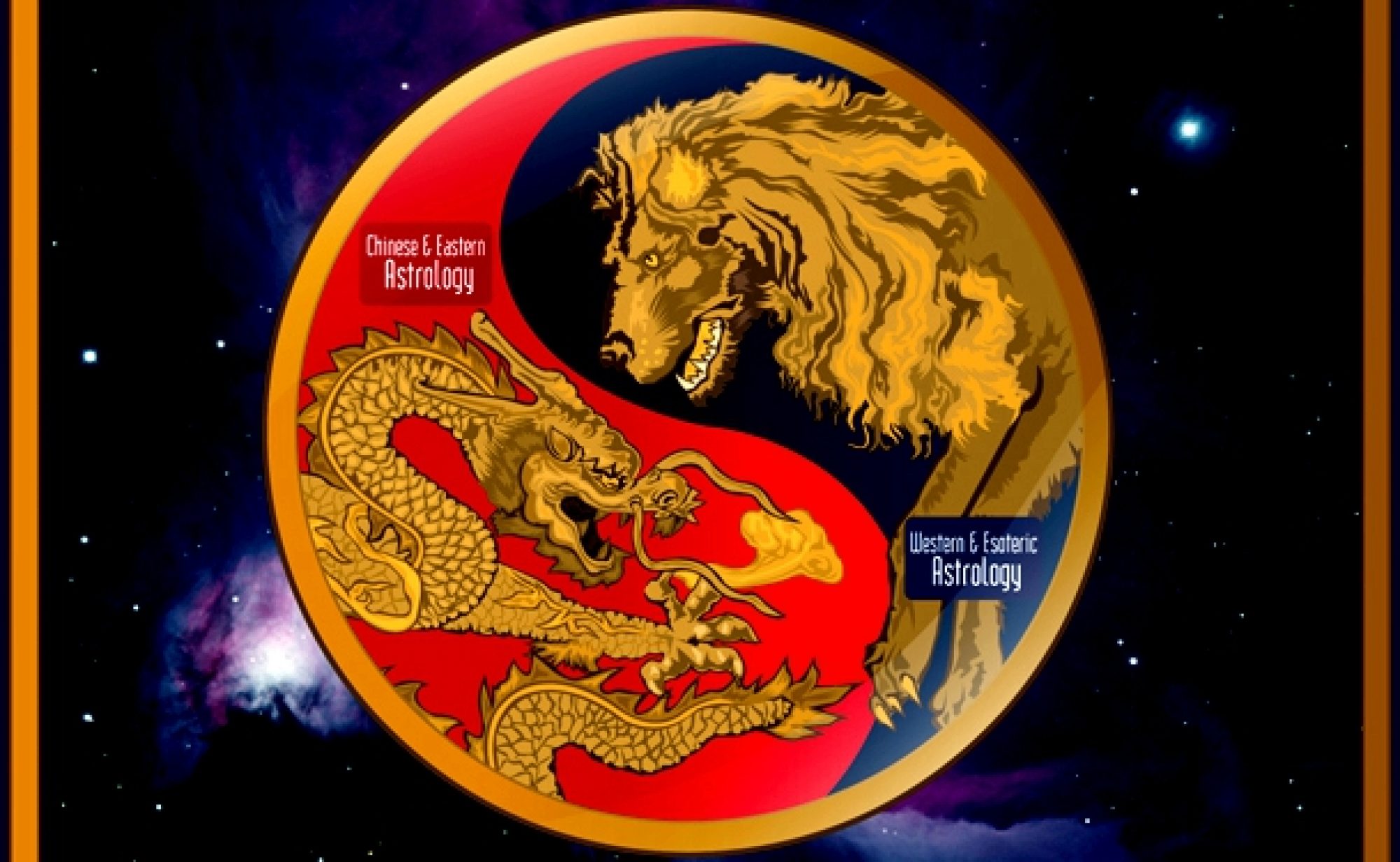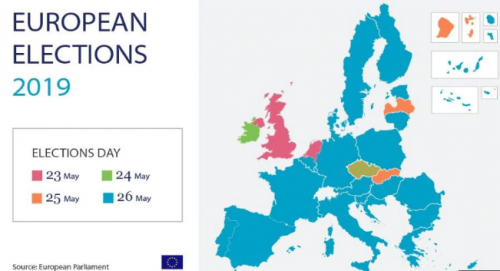Europe goes to the polls starting tomorrow, and continuing through the 26th, to elect a new EU Parliament. These elections are going to be closely watched. Change is in the air, and the European establishment is ill-at-ease. Europe has taken a turn toward conservative/reactionary parties in recent years. Fears of the return of fascism to Europe are being whipped up. The mainstream media calls the emerging parties ‘far-right’, hoping to marginalize them. It’s not working. People are fed up with ‘politics as usual’ in Europe. Big changes are coming to the EU. But, is the future for Europe as dystopic as the fear mongers are saying?
The European Parliament, at least the modern version of it – the political body – had its birth on 13 May 1958. It celebrated its 50th anniversary on that date in 2008. That chart is below (bigger).We will come back to it as we go along.
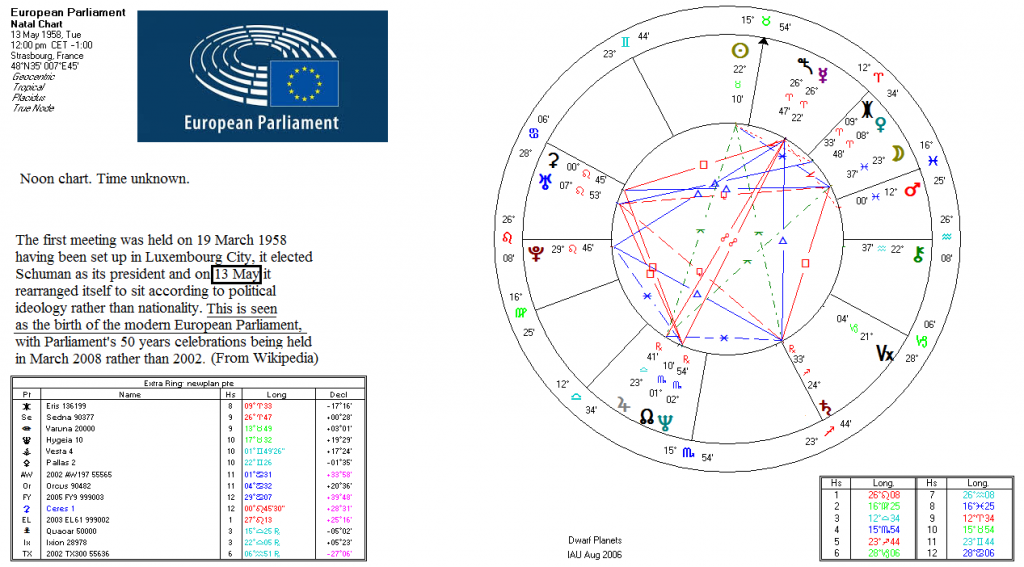
There is a problem with trying to predict/forecast outcomes for this election, and that relates to there being three charts that must be considered in looking at the outcome – the chart of the EU itself, the chart of the Parliament (above) and the chart for the Eurozone. The most important of these three charts is that of the Eurozone, which is at the root of the EU’s problems. So, just to be clear about what is taking place in Europe and why these elections are so important, the EU is facing probably its most significant existential crisis – a crisis that was built into it by design – a crisis that is meant to produce a federation that would remove the sovereignty of its individual member states. In other words, the EU was set up to become a super-state, though that was far from its original intention.
There are many who would argue that such a state of affairs already exists in the EU, but such is not the case. There is still time to offset what was planned. And what exactly was that plan? Much of this has been discussed in a separate article, but the gist of it is this:
“Some day the nations of Europe may be ready to merge their national identities and create a new European Union – the United States of Europe. If and when they do, a European Government will take over all the functions which the Federal government now provides in the U.S., or in Canada or Australia. This will involve the creation of a “full economic and monetary union”. But it is a dangerous error to believe that monetary and economic union can precede a political union or that it will act (in the words of the Werner report) “as a leaven for the evolvement of a political union which in the long run it will in any case be unable to do without”. For if the creation of a monetary union and Community control over national budgets generates pressures which lead to a breakdown of the whole system it will prevent the development of a political union, not promote it.”
Given all this, what do we see for the outcome of the elections? We’ll start with the astrology and then outline a few factors/factions that are seeking to meddle in European affairs, aimed at breaking up the EU (Hint: It’s not the Russians. Instead, beware of false friends.) The transits and directions to the chart of the Eurozone are below (bigger):
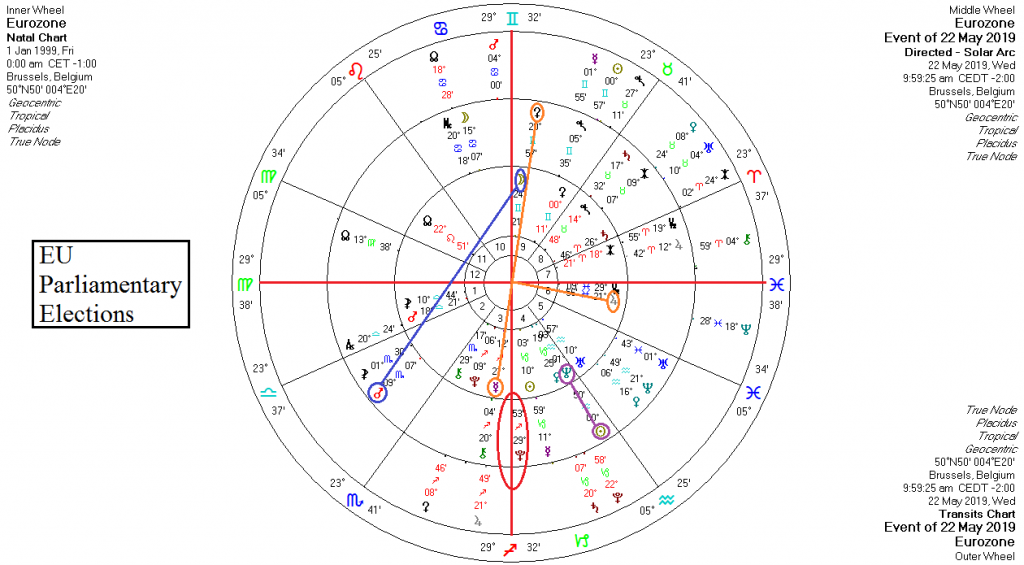
There are not especially terrible transits to the Eurozone chart during the election. Instead, we see optimistic Jupiter transiting over Mercury, which rules the Eurozone Ascendant and MC. That by itself would auger for a ‘good’ outcome for the establishment. When we move to the directions, though, a different picture emerges. Pluto has been activating the major axes since the first quarter of 2018. This was around the time that Salvini and Di Maio in Italy began pressuring the EU over its budget proposals and were making noises about floating a parallel currency, or even withdrawing from the Eurozone. Their actions sent a shiver through the EU banking sector. That Pluto direction is still in effect. And the sentiments expressed by the Italian government have not gone away.
Then, there is a progression/direction of the Sun to the EU Neptune, the latter ruling the 7th house (contracts, treaties and agreements). Of particular interest here is that Neptune squares Saturn in the Eurozone chart, pointing to a heavy-handed approach to financial dealings and a lack of vision. It doesn’t allow for ‘thinking outside the box’. Further, Saturn is placed in the 8th house (international banking and debt), showing the controlling interests of foreign banks in the EU as well as the intra-national control, primarily by French and German banks.
A prime example of that control and lack of vision was the Greek debt crisis, which came to a head in 2015, when the Greeks buckled under to the Troika. At that time (July 2015) the directed Sun was square to the Eurozone Saturn and directed Saturn was within orb of all the Eurozone angles, including the Vertex. It was one of the Eurozone’s biggest mistakes, but it sent a clear message to the other EU states. The Greek debt should have been forgiven, at least in part. But then, Saturn is not known for being forgiving. That episode showed the hand of the original planners of the Eurozone for anyone who was paying attention, referencing the quote above. Now, with Pluto to the angles, it signals the end of an era. Given the Greek experience, no other state is likely to go the route the Greeks took. The Greek government sold out the Greek people. They didn’t have to do so.
Then, there is a direction of Ceres, marking a turning point in the Eurozone history. It is directed opposite Mercury (ruling the 1st and 10th houses) and square to Jupiter, ruling the 4th house (opposition parties and public rebellion). The direction comes from the 9th house, and this shows the influence of foreign actors, like Steve Bannon for instance, who was seeking to rally alternative parties within Europe to confront the EU establishment. The biggest one, though, would be NATO. Bannon’s movement, called The Movement, has since fallen flat. But, he has stated before that he would like to see the EU break up. The Russians, on the other hand, want a strong and viable EU with whom they can negotiate as a block. At one point they even wanted to be a part of the EU. Lastly, there is a direction of Mars to the Eurozone Moon, which co-rules the 10th house (sitting leadership) and shows the tensions that are rising within the Eurozone.
What all this points to is that these elections are going to place quite a bit of pressure for changes within the EU leadership and calls for changing the structure of the Eurozone, even to the point of doing away with it eventually, speaking of the single currency. It may lead to the breakup of the zone in the future, but that does not necessarily mean a breakup of the EU. The EU could, and does, function quite well with diverse currencies, like the Pound, the Krone and the Krona in addition to the Euro. What needs to change is the banking system in the EU, to allow for greater economic sovereignty for the member states.
When we look at the chart of the EU, the situation is not so dire or immanent as it is for the Eurozone. What we see instead is very similar to what we saw in the recent Australian elections (and here) – an upset or upsets. The chart with transits, progressions and directions is below (bigger):
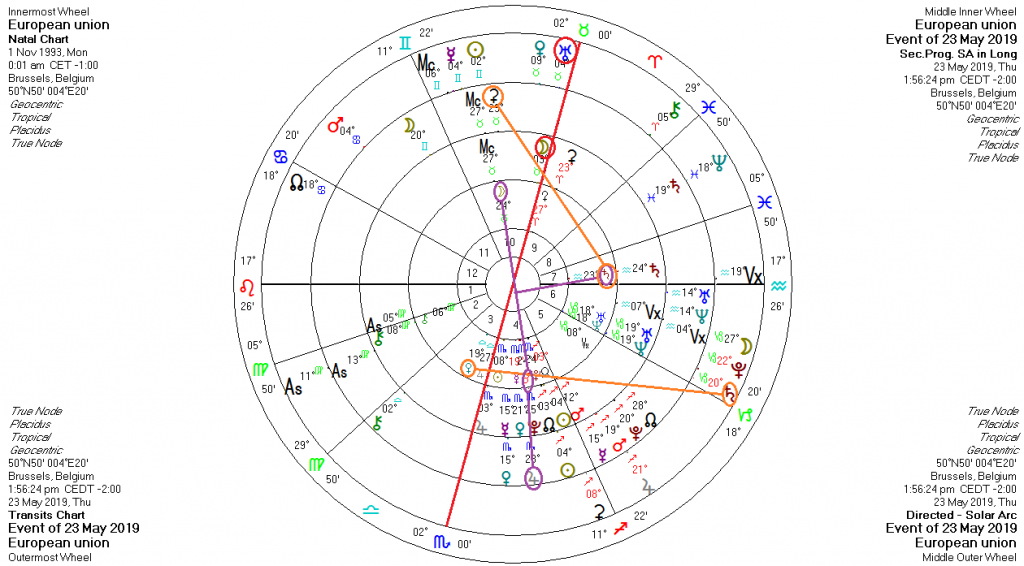
The immediate thing that stands out is the progressed Moon forming a midpoint between the MC and transiting Uranus. It is a combination that points to irritability, being easily upset, sudden changes of mood and so forth. We can probably bet that the establishment (MC) is not going to be happy with the results. It is not difficult to understand why, especially with Britain now taking part in the elections.
Much has been made in the past year or so of the rise of ‘far right’ parties in Europe. This has been especially noted in Austria, the UK, Italy and Hungary in most reporting. But if we take a step back and look past the labels the press places on these parties, we need to ask ourselves a question: Why have these parties risen in the first place? The reason can be traced back to two main items, which are the immigration crisis of 2015 and the economy since the economic crisis of 2008.
The nations that have leaned farthest to the right in recent elections are in the heart of the EU – Switzerland, Austria and Hungary. The next-closest nations are all of EU Scandinavia and Italy. And in general, most of the EU has seen the trend to some extent. But to paint the people who voted for these parties as reactionary, racist, fascist and nationalist would be a grave error. If you live in Europe, as I do, these are fellow citizens. They are not fascist, nor for the most part racist, and except for fringe groups, want no part of any sort of fascist/racist leanings. What they do want is a say over their economic destiny, relief from IMF austerity policies, to be heard by their governments and to see their cultures preserved. The thing one might find strange or amusing in the linked article is the lack of change noted by the BBC for the UK in terms of the far right. It was the ‘far right’ that swung the Brexit vote in the UK, with UKIP – definitely a right wing nationalist party – now surging in the polls ahead of the EU vote.
Projected results by the polls show some surprising results, however. (See also here) For all the hand-wringing about the far right taking hold in the EU Parliament, quite the opposite is shown in the polls. In fact, what is or should be a more worrying trend in the elections are the gains projected by the ALDE coalition parties, which include Macron’s party. The Yellow Vests won’t be happy if that is the case. The ALDE is the coalition at the heart of neoliberal economics in Europe, wants a strong European federation and is pro-single market. These are the people who are pro-austerity and globalist. Those gains, though, will be counterbalanced by the British Brexit parties and the right wing ENF/EAPN parties. So, even though there will be gains by the right wing, there will also be gains by the neo-liberals.
In addition to the Moon/Uranus/MC connection, directed Jupiter is activating a most descriptive t-square in the EU chart: Mars/Moon opposition square Saturn, and it is a close t-square. This points to a lack of empathy in the governing structure of the EU, a disconnect with the people, and poor decision-making. With the direction of Jupiter, that t-square will become over-activated. Jupiter in this case will accelerate what is emerging as the existential crisis of the EU, cited earlier.
And to accentuate the points just made regarding the natal t-square of the EU, directed Ceres is square the EU Saturn now, marking a turning point in EU history. By September of this year it will fully activate the aforementioned t-square. The new parliament should be operational by then. It will be fascinating to watch.
Expect to see upsets in these elections, then. The mood in Europe is changing. More and more people want to see the EU reformed, in favor of its people instead of career politicians, and they want saner immigration laws. But the operational term here is reformed, not broken up. There is still majority support for the EU within its nation states. For nations in the immigrant corridor – from Italy, up through Austria, Germany and into Scandinavia, immigration reform is a hot-ticket issue. And that brings us to the last chart, the directions and transits to the EU Parliament chart, below (bigger):
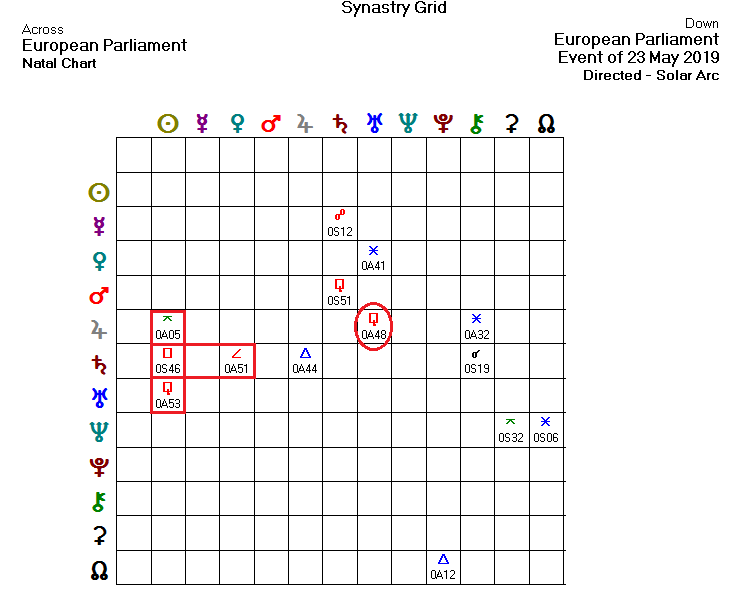
Since we don’t have a time of day for that chart we can only comment on the directions and transits to the planets, not counting the Moon. But even at that, there are some revealing points. Firstly, the EU Parliament is entering its balsamic progressed Moon phase, which is not normally an easy time. We are not sure when, but it will be soon and will last for a couple of years at least. It marks a period of reassessment and can be rather gloomy if people do not like the way things have turned out. Rather than seeing that period as one that can mark a positive change, people often rebel and sink into negativity. Given the mood in the EU, we can probably expect the latter.
The directions reveal that the intransigent attitudes of many MPs will be on display, shown by the Saturn/Uranus directions to the Sun, and will further show the stresses introduced by the increased memberships as indicated earlier, who in some ways are strongly opposed to each other. Saturn is applying to a direction with Venus, further showing a darker mood in the assembly. The bright spot there is the direction of Jupiter to Uranus, but even that is a mixed blessing. On the one hand it can represent a lucky break and sudden flashes of insight. On the other hand it can show a rigid adherence to values and we can thus expect many arguments about what constitutes ‘European values’. So yes, it is going to be interesting to watch. But the future of Europe is a stake. We’ll indeed watch this with great interest, holding the light for the unity of Europe, and there will be an update once the elections are finished, the dust has settled and the reality has sunk in.
Featured pic from SBS News
